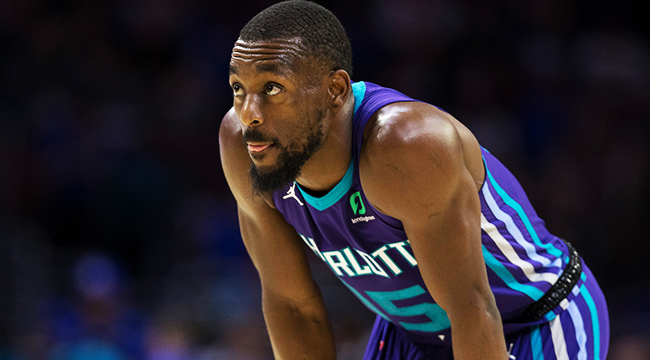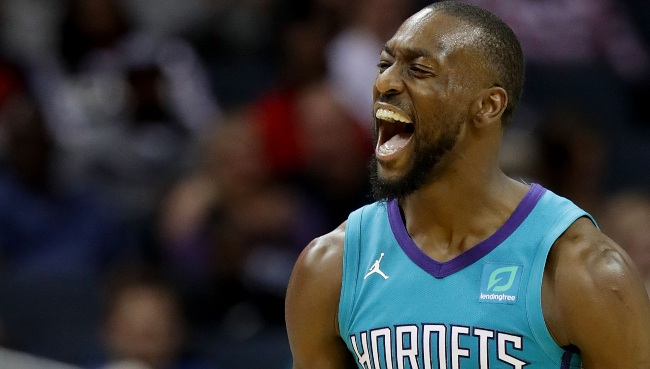
CHARLOTTE – If you turn on a Carolina Panthers game, you should pay attention to their offense. Cam Newton is the recognizable alpha, an insanely large human with unfair skills for a guy his size. Slightly below him on the pecking order is running back Christian McCaffrey, one of the league’s most versatile players.
McCaffery is a running back by name, but you almost can’t tell by the way Carolina uses him. He’ll receive traditional handoffs or pitches from the backfield, but Carolina will split him out wide just as often. He isn’t just a threat in the screen game; he’s a skilled enough route runner to abuse linebackers or corners in space. With a player as elusive as McCaffrey, the goal is to feed him early, often, and in a multitude of ways. He’s on track for a historic season, and certainly ranks among the six or so best players at his position.
Funnily enough, McCaffrey may not be the best running back in his own city. That title belongs to Kemba Walker.
Usually, point guards are compared to quarterbacks whenever cross-sport analogies pop up. To a degree, that comparison holds weight when it comes to Walker. Not only is he the unquestioned leader of the Charlotte Hornets, he directs the action, leading the team in assists (6.3) and points generated by assists (14.8) per game. But Walker is a lot more McCaffrey than Newton: in stature (both are six-foot or shorter), role, and style.
Walker is enjoying the best season of his career, scoring more points (24.9) than ever with a 55.5 true shooting percentage. New head coach James Borrego has emphasized pushing the pace this season, something that has amplified the talents of his athletic roster.
“It fits the skill level and the strengths of all of our guys, but Kemba especially,” Hornets center Cody Zeller told Dime.
With the Hornets getting down the floor and into their sets quicker, defenses haven’t had the chance to load up against Walker like they have in years past. They’re constantly playing catch-up, which makes Walker even more dangerous.
Much like McCaffrey, Walker’s M.O. is to get his man on an island and get him leaning the wrong way. A hard dribble to the left is a precursor to a drive to his right. His hesitation dribble freezes you before he burns you. Once you start to hang back in preparation for the drive, he stops on a dime for pull-ups all over the place.
There’s no real answer for Walker on his own. He’s generating 1.17 points per isolation possession, putting him in the 92nd percentile. Add a screener into the fold, and you might as well head back the other way.
“He makes everyone’s job easier,” Zeller says. “We just try to spread the court for him and set solid screens. He always makes the right play. He’s been good for us.”
How good? Walker is producing 1.05 points per pick-and-roll possession, placing him in the 89th percentile league-wide.
He’s up to eight games of 30 or more points this season, including a 60-burger (with sauce!) against the Philadelphia 76ers last month. Though he’s been blazing defenses with even more swagger than usual, Walker doesn’t feel like he’s doing anything revolutionary. When asked if he’s seeing the floor differently this year, his answer is, well, indifferent.
“Nah, not really,” Walker tells Dime with a casual shrug. “It’s the same stuff. I’m a lot older. It’s my eighth year in the NBA now, so things are just a little bit slower for me.”
The Hornets have sped up while the game slows down for Walker. It’s an oxymoron of sorts, but it’s also a telltale sign of a star’s maturation. He’s been shouldering a gigantic load this season, and has mostly handled it well because he’s so darn good.
But just like McCaffrey can only do so much, there’s a limit to Walker’s gravitational pull. When Walker is off his game — due to defense, fatigue, or just general shooting randomness — the Hornets suffer.
The Hornets went 0-2 this past weekend. They lost an overtime heartbreaker to the New York Knicks on Friday night, then got blasted by the Los Angeles Lakers on Saturday. Walker scored a combined eight points on 8-of-33 shooting between those contests. In December, Walker is averaging just 17.9 points with a 32/25/84 shooting split.
Some regression was expected after Walker’s ridiculous start to the season, but not this. It’s one thing to go through a shooting slump — missed shots were the story of his 6-for-20 performance against the Knicks. Against the Lakers, Walker didn’t seem very aggressive.

He scored just four points on 2-for-13 shooting, but many of those shot attempts came early. More often than not, Walker served as the trigger man of sets instead of the finisher. He often shifted the defense by coming off of screens and pindowns before deferring to Jeremy Lamb (12 points on 4-for-9 shooting) or Malik Monk (19 points on 7-for-14 shooting). There’s obviously value in getting others involved, but it meant virtually nothing without Walker doing his usual damage.
Therein lies the rub with Walker and the Hornets. Walker is so much better than his peers that they need him to shoulder a boulder-size load … but Walker also needs help. He can’t do it alone, evidenced by his 60-point explosion coming in a loss. The Hornets have guys that can chip in, but no one that can carry a load when Walker isn’t a super human.
To Walker’s credit, he’s a fantastic leader. He’s a fiery competitor, but he manages to stay realistic while holding himself accountable, probably to a fault. After the Lakers game, he was asked about fatigue in relation to his December struggles. While it would’ve been more than fair to acknowledge the obvious, he managed to downplay it while also leaning into the expectation of his role.
“I’m fine, I’m just off,” Walker says. “It happens, man. I’m not gonna be getting 40, 30 [points] every single night. I’m not gonna shoot the basketball every single night. I know how I’ve been playing. I’ve had some great games, and I know that’s probably the expectation nowadays, but it happens.”
He’s also fiercely loyal to his guys. When asked about Charlotte’s supporting cast, specifically if they’re good enough to help Charlotte get over the .500 hump, Walker tersely said he wouldn’t answer.
It’s clear that the Hornets have a small margin for error, even when Walker plays well. It’s something that coach Borrego has acknowledged before, saying the Hornets basically have to play a perfect game sometimes. Walker, of course, embraces that challenge.
“We just gotta try and do it,” Walker says. “We gotta try and capitalize. We gotta be as good as we can be, as a team. It’s tough to win in this league, man. We just gotta be on point.”
For the most part, Walker has been on point. If you want to continue the football analogy, he’s been their every-down back. He’s consistently found ways to thrive against an 8-man box. Eventually, though, Walker will need some help.
We got a glimpse into what the Hornets look like with a tired Walker, even if he didn’t want to admit it. The Hornets have third-down backs, guys that can move the chains in a pinch. But there’s no other star, no other big play threat that strikes fear in the opponent. Until Charlotte drafts or acquires one, they run the risk of burning Walker out.






